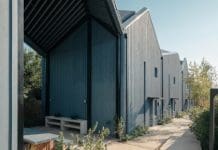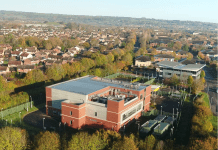In the UK, fewer than 2% of tradespeople are female. In 2022 this is a shocking statistic and when compared with North America, where the figure rises to 10%, it shows we still have a very long way to go when it comes to diversity in construction, says Sandi Rhys-Jones, senior vice-president of the Chartered Institute of Building
It’s important to remember why this lack of diversity in construction is a problem and in simple terms, it means employers are missing out; missing out on innovation, missing out on different viewpoints and missing out on creativity, all of which are needed for a company to be truly successful, not just in terms of profitability but also employee wellbeing and client satisfaction.
As senior vice-president at the Chartered Institute of Building (CIOB) and a woman who has been in and around the industry for many years, increasing diversity in construction and, in particular, female representation is a matter close to my heart.
It was an honour to recently be part of an uplifting event, hosted by CIOB in the Houses of Parliament, along with Emily Thornberry MP and a delegation of inspiring women from North America, who spoke of their own battles to break into the male-dominated construction world, and how they’re gradually bringing about much-needed change.
The education and employment system is broken
Tradeswomen Building Bridges are a force to be reckoned with and the group’s founder, Susan Moir, didn’t hold back when it came to calling out why the UK is lagging behind North America when it comes to getting more women into trades. Essentially, the education and employment system is broken and needs to change. It’s about more than just providing female toilets, which are a good start but aren’t enough to drive up the numbers to the level we need.
Susan spoke passionately about the importance of role models, education and trade unions, which were met with nodding heads, applause and even some whooping from our guests. We can and should learn a lot from Susan and the North American model for increasing female representation, and I see the parliamentary event as just the start of CIOB’s relationship with them as we support our members to embrace diversity.
It’s not just on large construction projects where more female tradespeople are needed, however, but at a domestic level, there’s a demand that simply isn’t being met. Prior to the event, CIOB commissioned consumer research that revealed three in five UK residents would hire a female tradesperson to carry out work at their home, but 10% said they have tried to find one with no success.
The desire to support more women taking up trades was a clear theme from the research findings, yet it would appear not enough of us encourage the young women in our lives to consider trade-based careers and the perception that these jobs are for boys, sadly still exists.
75 companies have signed the ED&I charter
Increasing diversity in construction takes teamwork and effort from those within it but also wider society. As a professional body for those working in the industry, CIOB continues to offer support and guidance and in 2021 employed a full-time head of equality, diversity and inclusion (ED&I) for this very reason. Later that year, its ED&I charter was launched asking employers in the built environment to sign up to five actions to foster a more diverse and inclusive workspace.
At the end of June, 75 companies have so far signed the charter and committed to showing leadership, planning and creating a welcoming culture, and being transparent and accountable for their own progress. By signing up they’re demonstrating to potential recruits they want to attract the best talent from all walks of life, which it’s recognised improves employee belonging and enhances credibility with clients.
It shows the willingness to progress is there but we all need to do more if we’re to create a built environment for the UK’s diverse communities – something that can only be achieved if the people designing and creating those environments are as diverse as the communities themselves.
Sandi Rhys-Jones

Senior vice-president
Chartered Institute of Building
Tel: +44 (0) 1344 630700

















